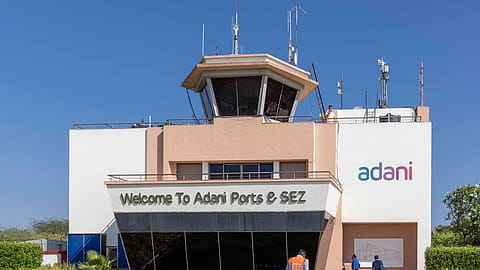Adani Ports shares may come under pressure on Monday after Iran targets Haifa in latest strike
APSEZ had acquired the port in 2023 for $1.15 billion to strengthen its Middle East presence

The shares of Adani Ports and Special Economic Zone (APSEZ) are likely to come under pressure when the markets open on Monday, after Iran claimed to have targeted key military and energy infrastructure in Israel’s port city of Haifa—home to one of the most strategic overseas assets in the Adani group’s infrastructure portfolio. APSEZ stock had ended Friday at ₹1,406, having come off over 4% over the past five trading sessions on concerns over the Iran-Israel conflict.
Haifa Port, Israel’s largest and most vital seaport on the Mediterranean coast, is operated by a consortium led by APSEZ (70% stake) and Israel’s Gadot Group. Adani Ports had acquired the asset in January 2023 as part of Israel’s port privatisation push, marking a high-profile entry into the Mediterranean shipping and logistics corridor. The group paid nearly shekels 4 billion ($1.15 billion) for the deal and has since been working to scale operations.
The port is a jewel in Adani’s growing international port portfolio as it provides a critical gateway to the Europe-Asia trade route via the Suez Canal and plays a key role in the proposed India-Middle East-Europe Corridor (IMEC). The port handled over 10.6 million metric tonnes (MMT) of cargo in FY25 and has deep linkages with Israel’s railway and energy infrastructure, amplifying concerns following the latest strike.
APSEZ has previously stated that Haifa Port significantly widens its footprint in the Middle East and offers access to the busy Mediterranean shipping lanes, positioning the company to benefit from rising India-Europe trade flows.
Adani had taken on debt to consummate the acquisition. The deal was funded through shekel 2.7 billion in debt, including borrowings from Israel’s Bank Mizrahi and Adani International Port Holdings (AIPH), with ongoing efforts to refinance the liabilities. As these loans are now coming up for maturity, Mediterranean International Ports A.D.G.D. Limited (MIPAL) proposes to refinance such loans for a longer duration of 7 years. MIPAL is a joint venture between APSEZ Ports and Israel’s Gadot Group (30%), formed specifically to acquire and operate the Haifa Port Company. A loan of shekel 1.1 billion from Bank Mizrahi is due in June 2025. But the geopolitical situation now adds uncertainty to both operational cash flows and future down-selling of the loans to other financial institutions. APSEZ has committed to infusing an additional shekel 125 million to fund refinancing costs and potential debt servicing shortfalls.
While APSEZ has noted in its FY25 annual report that operations have not been materially impacted, the escalation in conflict puts a spotlight on regional risks that could affect shipping volumes, insurance costs, and long-term returns on investment.
Markets will closely monitor updates from the Israeli government and Adani Group’s disclosures to gauge whether Haifa Port infrastructure was directly damaged and whether any disruption to cargo operations is expected. Any adverse updates could weigh on investor sentiment, particularly given the strategic and financial exposure embedded in this asset.
